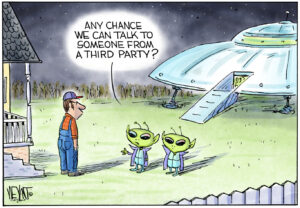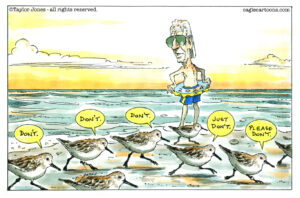How to Steal an Election With the Help of FISA
There's a lot more to object to in the new FISA bill than just retroactive immunity for the telecoms. It seems that the regulation of surveillance is still hopelessly out of date. How is a court supposed to handle complex algorithms and countless terabytes of data? Truthdig contributor Elliot Cohen warns that the new law could conceivably allow the theft of the 2008 presidential election.There’s a lot more to object to in the new FISA bill than just retroactive immunity for the telecoms. It seems that the regulation of surveillance is still hopelessly out of date. How is a court supposed to handle complex algorithms and countless terabytes of data? Truthdig contributor Elliot Cohen warns that the new law could conceivably allow the theft of the 2008 presidential election.
That’s on top of the fact that it gives telecoms a pass and could be “tantamount to a blank check to invade the privacy of every American citizen.”
Your support matters…BuzzFlash:
Without rigorous judicial oversight and monitoring of surveillance procedures, the Bush administration will, in the next months, have a timely window of opportunity to intercept its Democratic opponents’ email messages and phone calls according to self-serving algorithms that screen for names, addresses, and other indicators that are correlated to these individuals. During the Nixon administration technology was not so sophisticated and Nixon’s Burglars had to break into Democratic National Headquarters in order to plant a bug. This can now be done simply by implanting the appropriate algorithm into an NSA computer network.
Second, electronic voting is essentially tied to the phone lines because all votes cast in individual precincts must pass through the phone lines on their way to be tabulated at the main tabulation center. This makes it possible to electronically reconfigure votes before they even arrive at a central tabulation point by embedding the appropriate software in the lines, thereby destroying the prospect of a fair election outcome.
This case resembles “black box” voting where once the votes are cast, it is impossible to see what happens to them. Those who have seen the danger of this have sought to create a paper trail that could provide a means of verifying an election outcome. But now we may be faced with a potentially more ominous strain of the black box problem — votes that disappear into the void of cyberspace only to reappear at the other end of a wire in an altered state. In this digital age, independent inspection of voting machines and careful monitoring of election practices may therefore prove insufficient when cyberspace is not also safeguarded.
Independent journalism is under threat and overshadowed by heavily funded mainstream media.
You can help level the playing field. Become a member.
Your tax-deductible contribution keeps us digging beneath the headlines to give you thought-provoking, investigative reporting and analysis that unearths what's really happening- without compromise.
Give today to support our courageous, independent journalists.






You need to be a supporter to comment.
There are currently no responses to this article.
Be the first to respond.